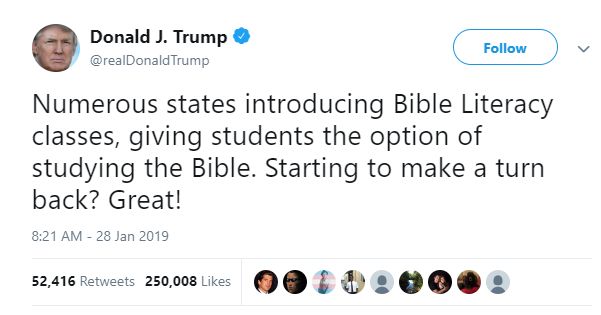 WASHINGTON — President Trump tweeted his support on Monday for recently-introduced state bills that would authorize the creation of elective Bible courses in public schools.
WASHINGTON — President Trump tweeted his support on Monday for recently-introduced state bills that would authorize the creation of elective Bible courses in public schools.
“Numerous states introducing Bible literacy classes, giving students the option of studying the Bible. Starting to make a turn back? Great!” he wrote.
Trump’s remarks reportedly came after Fox & Friends interviewed North Dakota state Rep. Aaron McWilliams about a bill that he had co-sponsored, and noted that legislation has been presented in other states as well.
“Without allowing a Bible into the schools, without allowing a Quran or any other religious text in the school, we look at establishing a religion of secularism in our schools without having anything else,” he stated, according to a report from Fox.
As previously reported, Sen. Oley Larsen, R-Minot, introduced Senate Bill 2136 earlier this month, which would have made studies in the Old or New Testament—or both—available for students, and would have allowed surrounding the three units of social studies required for graduation that “any one-half unit may be replaced by Bible studies.”
“This is an alternative to a history class elective if a student is interested in the history of the Bible,” Larsen told the High Plains Reader. “It is the one piece of information that founded our country. I believe that history has been lost.”
However, Education Week reports that the bill was rejected by the state Senate 42-5 on Friday.
Legislation is also being considered in Virginia, but Senate Bill 1502 filed by Charles Carrico, R-Bristol, mandates that the classes not “favor [or] disfavor … any particular religion or nonreligious perspective.”
A similar bill was also filed in Florida by Democratic Rep. Kimberly Davis, and Indiana and Missouri are likewise set to vote on the option.
Groups such as the American Civil Liberties Union (ACLU) and Americans United for Separation of Church and State have expressed opposition to the elective Bible classes. In a post published on Monday, Americans United called the proposed offering a “threat.”
“So-called ‘Bible literacy’ courses may look all right on the surface, but you don’t have to probe too deeply to expose serious problems,” wrote Senior Advisor Rob Boston. “Often, these courses are just a cover to bring a fundamentalist interpretation of the Bible into public schools. Essentially, they’re Sunday School lessons masquerading as legitimate instruction.”
He said that the classes aren’t unconstitutional in and of themselves, but stated that they “must be taught in a nondevotional manner with no attempt made to indoctrinate students as to either the truth or falsity of biblical accounts.”
“The courses should not be taught from the perspective that the Bible is a literal historical record, and such courses must expose students to critical perspectives on the Bible and a diversity of scholarly interpretations,” Boston wrote.
As previously reported, in 1791—just four years after the signing of the U.S. Constitution—Dr. Benjamin Rush, a signer of the Declaration of Independence and vice-president of the Bible Society of Philadelphia, said in expressing his disagreement with deists who were opposed to using the Bible in schools:
“In contemplating the political institutions of the United States, I lament that we waste so much time and money in punishing crimes, and take so little pains to prevent them. We profess to be republicans, and yet we neglect the only means of establishing and perpetuating our republican forms of government, that is, the universal education of our youth in the principles of Christianity by means of the Bible, for this divine book, above all others, favors that equality among mankind, that respect for just laws, and all those sober and frugal virtues, which constitute the soul of republicanism.”
Read his remarks in full here.
Noah Webster, known as the father of American education, also wrote in his publication “Letters to a Young Man Commencing His Education”:
“Let it then be the first study of your early years to learn in what consists real worth or dignity of character. To ascertain this important point, consider the character and attributes of the Supreme Being. As God is the only perfect being in the universe, His character, consisting of all that is good and great, must be the model of all human excellence, and His laws must of course be the only rules of conduct by which His rational creatures can reach any portion of like excellence.”
Become a Christian News Network Supporter...


